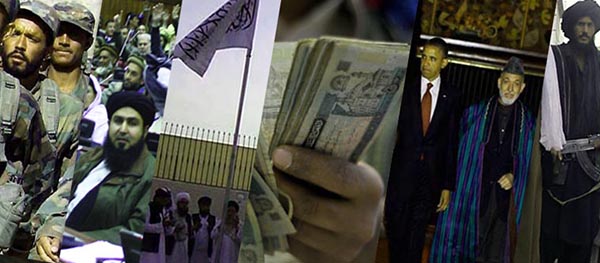Terrorism and the issue of Afghan peace process are highly interminable which still remain controversial after a decade. This jigsaw puzzle has been cut and fitted by political gamers time and again. Many Afghan high-ranking officials including the head of High Peace Council (HPC) have been assassinated for the sake of their struggles for peace talks. Moreover, many Afghan men, women and children suffered from militancy and acts of terror carried out by Taliban insurgents in one way or another. Let us put a glance over the political game played by the Taliban masterminds.
Following 9/11 attack, the US Congress passed the authorization for use of military force against terrorists. On October 7, 2001, the war in Afghanistan began when US and British forces initiated aerial bombing campaigns targeting Taliban and al-Qaeda camps, then later invaded Afghanistan with ground troops of the Special Forces. The overthrow of the Taliban rule of Afghanistan by a US-led coalition was the second-biggest operation of the US global war on terrorism outside of the United States, and the largest directly connected to terrorism. Conflict in Afghanistan between the Taliban insurgency and the International Security Assistance Force is still ongoing.
Tens of thousands of people attempted to flee Afghanistan following the attacks, fearing a response by the United States. Pakistan, already home to many Afghan refugees from pervious conflicts, closed its border with Afghanistan. Almost one month after the attacks, the US led a broad coalition of international forces to overthrow the Taliban regime from Afghanistan for their harboring of al-Qaeda. Though Pakistani authorities were initially reluctant to align themselves with the United States against the Taliban, they permitted the coalition access to their military bases, and arrested and handed over to the US over 600 suspected al-Qaeda members.
Taliban were overthrown by the American-led invasion of Afghanistan. Later it regrouped as an insurgency movement to fight the American-backed Karzai administration and the NATO-led International Security Assistance Force (ISAF). The Taliban have been accused of using terrorism as a specific tactic to further their ideological and political goals.
Seemingly, Usama bin Laden, a great leader of al-Qaeda, claimed the responsibility of 9/11 attack. He also said in a video talking to Khaled al-Harbi, “It has become clear that the West in general and America in particular have an unspeakable hatred for Islam …. It is the hatred of crusaders. Terrorism against America deserves to be praised because it was a response to injustice, aimed at forcing America to stop its support for Israel, which kills our people…. We say that the end of the United States is imminent, whether Bin Laden or his followers are alive or dead, for the awakening of the Muslim Umma has occurred.”
Taliban militants and Al-Qaeda gradually changed to a great threat to the Afghan and US forces. Acts of terror such as suicide bombings, bomb blasts, and other deadly attacks were launched by Taliban leading to the deaths of hundreds of Afghan police, civilians and US forces.
The Afghan government decided to hold negotiations with Taliban militants as a mechanism to end terrorism. President Karzai has long called on the Taliban to join the peace process. In late 2008 he even offered to provide security for the Taliban supreme leader, Mullah Omar, if he agreed to peace talks – this was not incentive enough.
The High Peace Council was established in 2010 and tasked with contacting the Taliban and convincing them to join the peace process. The members of High Peace Council (HPC) were making efforts days and nights in pursuit of brining Taliban’s leaders on the table of negotiation. However, all the efforts met failure repeatedly. In spite of the government‘s efforts focused on re-integrating Taliban fighters, they did not have a reconciliation strategy.
Sporadic contacts were made with a number of Taliban leaders but it did not have the desired outcome of provoking large-scale desertions.
In turn, the Taliban did not trust the Afghan government and considered it a “puppet” of the United State.
On June 18, 2013, Taliban opened an office as the first move towards peace deal after 12-years of fighting, but it enraged Afghan President by styling itself as an unofficial embassy for a government-in-exile. Mr. Karzai raised his concerns about the peace process not being Afghan-led. He suspended plans for Afghan officials to meet the Taliban in Qatar. His concerns were so great that US Secretary of State John Kerry had to promise that the Taliban flag and their sign reading “The Islamic Emirate of Afghanistan” would be removed. The flag remained, albeit on a shorter flagpole.
Recently, the members of Afghan High Peace Council (HPC) headed to Dubai to hold negotiation with Taliban led by Mutasim Aqa Jan, the former head of Taliban’s Political Committee. This comes when Mutasim said in Dubai meeting last week that as Pakistani Taliban hold talk with Pakistan, Afghan Taliban also have to negotiate with Afghan government. And Taliban’s message of peace was welcomed by Afghan National Security Council. Meanwhile, Mulavi Abdul Raqib, the Taliban’s former Minister of Refugee and Repatriation, who was also a member of Dubai peace negotiators, was assassinated by unknown gunmen in Pakistan and was carried to Takhar province by Afghan helicopter.
I believe that peace negotiation will not bear the desired fruit. Most probably, it is the same political game which has been played for many years. As Taliban are against signing Bilateral Security Agreement (BSA), one of their preconditions will be the withdrawal of foreign forces. Hence, if foreign forces withdraw from Afghanistan, is there any assurance that the militants will not continue their insurgencies?
Of course not! Moreover, I believe that there are many political masterminds behind the negotiation who plan for their own interests. What if they urge for a share in the future government? This is an issue of great worry for Afghan people especially by women. Hence, don’t you think that the Taliban will win as ever before?

